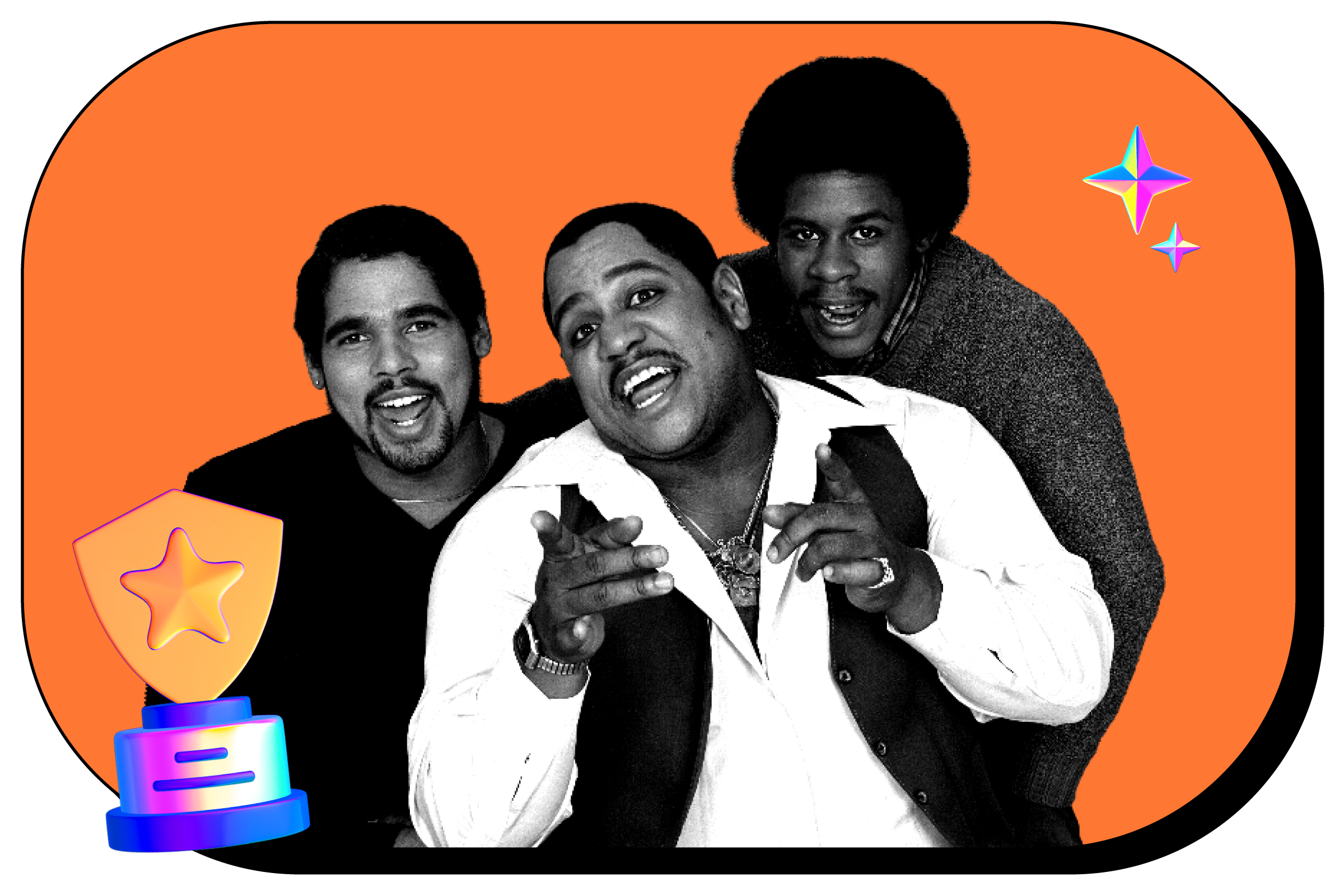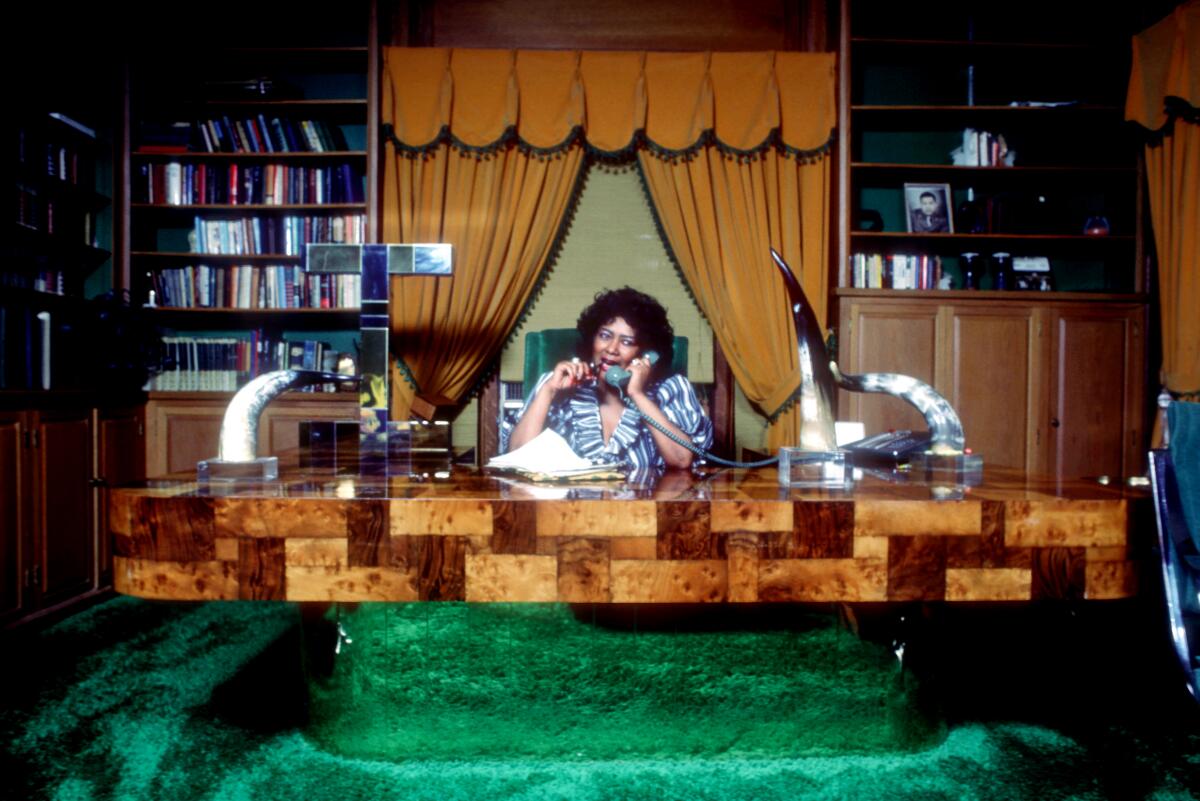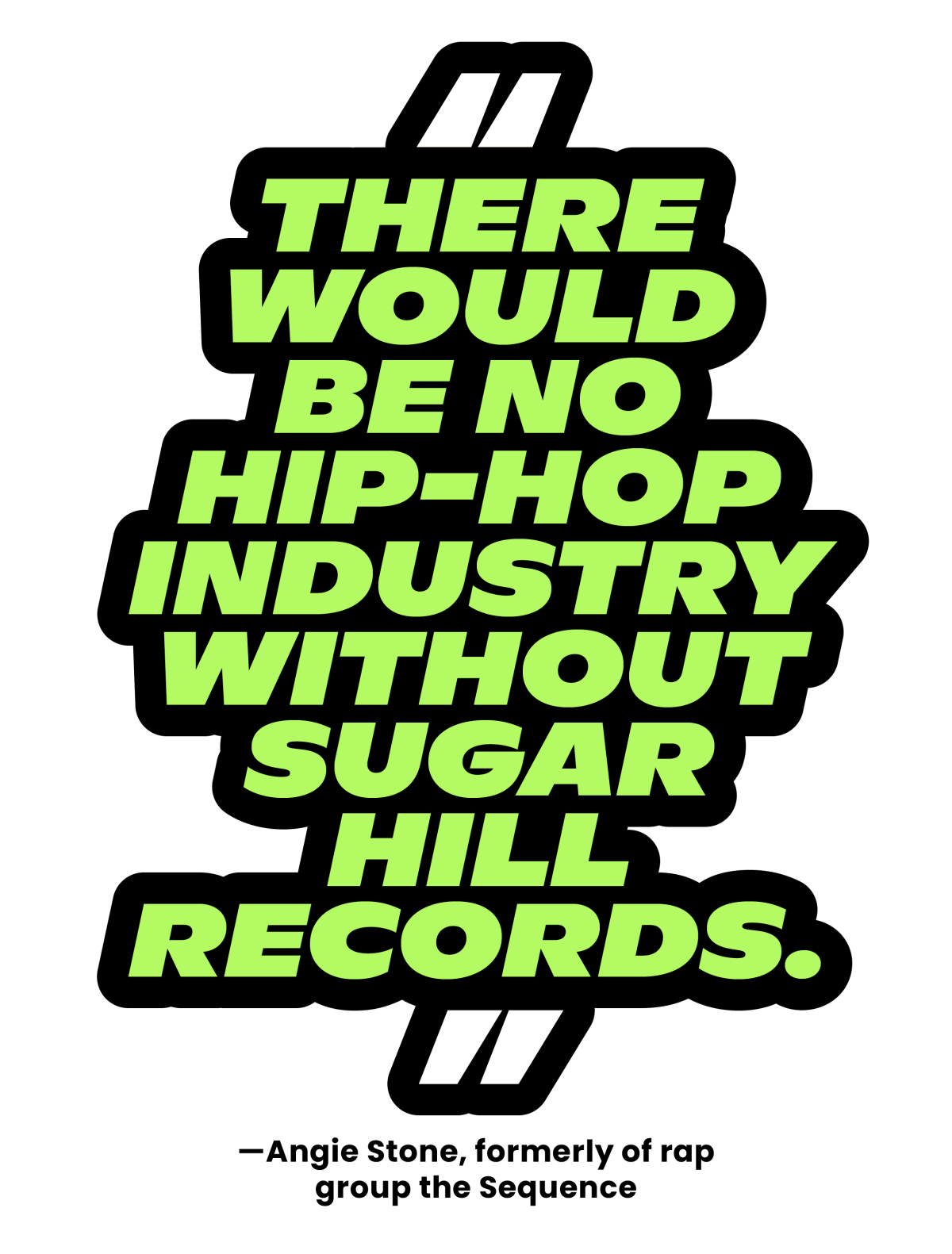The biggest entertainment stories
Get our big stories about Hollywood, film, television, music, arts, culture and more right in your inbox as soon as they publish.
You may occasionally receive promotional content from the Los Angeles Times.

On Oct. 20, 1979, high school friends Angela Brown, Cheryl Cook and Gwendolyn Chisolm found themselves in a make-or-break audition. Like many adventurous teens, the Columbia, S.C., natives were enamored with a new musical art form that had defiantly risen out of New York’s impoverished South Bronx: hip-hop.
Yet the record that inspired them to create their own rap group called the Sequence — which would become the first female and Southern rap act to sign a label deal — did not come out of the hallowed Boogie Down Bronx of hip-hop originators DJ Kool Herc, Afrika Bambaataa and Grandmaster Flash. “Rapper’s Delight,” the game-changing debut by the Sugarhill Gang, was produced out of Englewood, N.J., and featured unlikely rhyme pioneers Michael “Wonder Mike” Wright, Henry “Big Bank Hank” Jackson and Guy “Master Gee” O’Brien. “The Sugarhill Gang resonated with us,” says Brown, better known these days as Grammy-nominated R&B singer Angie Stone.

Somehow, Brown, Cook and Chisolm finessed their way inside Columbia’s Township Auditorium to see their heroes, the Sugarhill Gang, in concert. Soon, they were face-to-face performing for Sylvia Robinson, the larger-than-life founder and chief executive of the landmark rap label Sugar Hill Records.
After dropping a few verses of a catchy song the act had written titled “Funk You Up,” the label boss they eventually called Mrs. Rob smiled and said, “I’m going to make you girls stars.”
By winter, “Funk You Up” would become the second consecutive hit for Robinson and Sugar Hill.
“Ms. Robinson was a visionary,” Stone says of the groundbreaking executive, singer, songwriter, musician and producer. “People can say what they want about her, but you have to give her that. She went against the grain and took a chance on all of us at Sugar Hill.”
Before Robinson orchestrated the Sept. 16, 1979, release of “Rapper’s Delight”; before the track went on to sell more than 14 million copies around the world, igniting the most dominant youth movement of the last 50 years; before the song’s triumph transformed a small independent imprint into the first commercially viable rap label — a wide majority of America had never heard nor seen the Black street expression called hip-hop.

Today, hip-hop is the most listened to musical genre, generating billions of dollars. That’s thanks in no small part to the savvy instincts of Robinson and her no-nonsense husband, Joe, co-founder of Sugar Hill. Before “Rapper’s Delight,” it seemed ludicrous that a street genre exclusively performed live could even exist in a recorded format.
That changed in August 1979 when Sylvia Robinson, then 43, assembled the velvety-voiced Wonder Mike, the charismatic Big Bank Hank and the infectious Master Gee into her newly christened Sugar Hill Studios in Englewood.
“Rapper’s Delight” nicked the meaty groove and signature bass line from Chic’s disco smash “Good Times,” which had topped the Billboard Hot 100 that August. Robinson came up with the idea after attending a niece’s summer birthday party at the iconic club Harlem World.
“The DJ was playing music and talking over the music, and the kids were going crazy,” she recalled to the New Jersey Star-Ledger in 1997. She stood transfixed as the disc jockey manning the turntables delivered a call-and-response take on Chic’s monster anthem. “All of a sudden, something said to me, ‘Put something like that on a record, and it will be the biggest thing,’” Robinson added. “I didn’t even know you called it rap.”

Robinson conducted Sugar Hill Records’ airtight funk band Positive Force to replay “Good Times’” sweet spot. She meticulously guided her new signees’ rhyme performance. The Sugarhill Gang opened “Rapper’s Delight” with one of the most recognizable first lines in the history of popular music: “I said a hip-hop, the hippie, the hippie / to the hip, hip-hop and you don’t stop the rockin’…”
“We did the song in one take,” Wonder Mike recalled of the session to AllHipHop. “[‘Rapper’s Delight’] was 19 minutes, we cut it down to 15. And Mrs. Rob, God bless her, songs were short on the radio. She said, ‘No, we ain’t cutting this down… we are going to put it out just like that.’”
No one saw Sugar Hill Records or Mrs. Rob coming. Twenty-one years earlier, she had her first hit in 1957 as one-half of the R&B duo Mickey & Sylvia — Mickey Baker and Sylvia Vanderpool, her maiden name — with the million-selling gem called “Love Is Strange.” Sylvia wrote the crossover singalong, which has since been prominently featured in “Dirty Dancing” and “Casino.”
By the early ’60s, she was an accomplished R&B songwriter, so talent-stacked that she played guitar and arranged Ike and Tina Turner’s first major hit, “It’s Gonna Work Out Fine,” a rarity in those days for a woman in the male-dominated music biz.
In 1983, KDAY-AM became the first radio station to play wall-to-wall rap music, thanks to an ambitious new music director and some soon-to-be famous DJs.
In 1968, Joe and Sylvia Robinson, now married, established the soul music label All Platinum Records. The pair oversaw a string of Black radio favorites, including Sylvia’s self-penned, blush-inducing No. 3 pop single, “Pillow Talk,” in 1973. But by ’78, the Robinsons had declared bankruptcy. It looked bleak, until the couple hit the hip-hop jackpot.
“Rapper’s Delight” bombarded airwaves and dance clubs across the country and eventually worldwide. Despite stalling out at No. 36 on the pop charts, at its peak, the record moved a reported 50,000 copies per day.
While most mainstream music critics dismissed “Rapper’s Delight” as a novelty, the public ate it up. Chic’s Nile Rodgers, who co-wrote “Good Times” with late partner and bassist Bernard Edwards, was blindsided as the recording blasted through the speakers at Midtown Manhattan disco spot Leviticus.
“When I heard ‘Rapper’s Delight,’ I thought the DJ was doing it live,” Rodgers recalled in a 2006 Vanity Fair feature on the rise and fall of Sugar Hill Records. “Then I looked around and saw no DJ — he was standing right in front of me.”
Rodgers and Edwards quickly got in touch with their lawyer. The Robinsons scoffed at any talk of a deal, a byproduct of their days on the other end of brazenly shady music-industry practices. Sugar Hill’s chief investor, Morris Levy, intervened. Rodgers told the trade magazine Hits that he and Edwards ended up receiving writing credits and royalties on every 12” sold worth three times the suggested retail price.

During its initial run, “Rapper’s Delight” peaked at No. 4 on the R&B charts and became the first hip-hop record to enter the Billboard Top 40, selling 2 million units in just a few weeks. Yet not everyone embraced the record’s mammoth success. Melle Mel of the celebrated Grandmaster Flash and the Furious Five — the Sugar Hill Records act that would take hip-hop to new heights with its socially conscious 1982 statement “The Message” — dismissed the Sugarhill Gang as fake Garden State interlopers. The consensus from uptown rhyme purists was that “Rapper’s Delight” was a joke.
Before they formed, the three young men had never met. Unknown to Robinson, Big Bank Hank, who was discovered rapping while working at a pizza shop, didn’t write any of “Rapper’s Delight’s” most quotable verse (“Everybody go, ‘Hotel, motel, Holiday Inn’ / You see, if your girl starts acting up, then you take her friend…”). It turned out that he had “borrowed” the lyric book of hip-hop pioneer Grandmaster Caz, a member of the hip-hop outfit the Cold Crush Brothers, whom Hank had been managing. It was another strike against the authenticity of the Sugarhill Gang.
But it didn’t matter. Sugar Hill Records was on top, and the label now had street cred. 1981’s groundbreaking “The Adventures of Grandmaster Flash on the Wheels of Steel” was the first record to feature the scratching and mixing routines that were a hallmark of ’70s hip-hop park jams. By 1982, the label’s roster included early rap giants like Grandmaster Flash and the Furious Five, the Treacherous Three, the Funky 4 + 1 and Spoonie Gee.
The Sugar Hill Revue went on the road in the U.S. and overseas, the first such rap package tour. Mrs. Rob’s artists, which included gold-selling “Funk You Up” trio the Sequence, were now opening arena gigs for R&B and funk stars the O’Jays, Parliament-Funkadelic and Rick James. But momentum quickly cratered.
In 1988, Black rage — over social conditions, over police violence, over the scourge of crack — fueled coast-to-coast landmarks from Pubic Enemy, N.W.A and Ice-T.
Robinson’s hard-working house band members reportedly were not getting paid for their studio and songwriting contributions. Artists who complained about being cheated out of money soon found themselves on the outs with no publicity. Grandmaster Flash and others acts filed lawsuits against Sugar Hill Records for unpaid royalties.
“You had an OG like Mrs. Robinson who knew that if you accept a check as a work for hire, you could never come back to claim ownership on anything,” Stone says. “We all got duped from time to time because we were eager, young and excited to be working and touring. That was the chance we took to touch our dreams.”
Disillusioned artists, however, were the least of the Robinsons’ worries. A combination of a doomed distribution deal with a struggling MCA Records and an evolving hip-hop landscape led by the harder beats-and-rhymes swagger of Run-D.M.C. pushed Sugar Hill to the brink. Def Jam Records, with its growing all-star roster that included LL Cool J, the Beastie Boys and Public Enemy, essentially made the New Jersey label obsolete. After 26 gold records, the Robinsons folded Sugar Hill in 1986.
In 2011, Sylvia Robinson died at age 76 of congestive heart failure. A decade later, she was voted into the Rock & Roll Hall of Fame, joining Grandmaster Flash and the Furious Five, which became the first rap group inducted into the Rock Hall in 2007. The iconic label, with its instantly recognizable powder-blue candy-striped logo, will be forever credited with introducing rap to the masses.
“Everybody that made it after Sylvia Robinson learned from her,” Stone says. “There would be no hip-hop industry without Sugar Hill Records.”
The biggest entertainment stories
Get our big stories about Hollywood, film, television, music, arts, culture and more right in your inbox as soon as they publish.
You may occasionally receive promotional content from the Los Angeles Times.